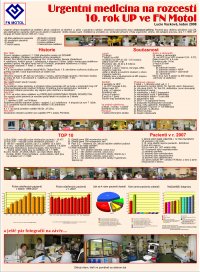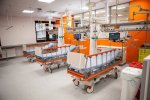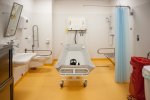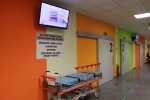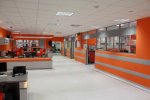- Basic information
- Management and staff
- Ambulance
- Specialization
- Information for patients
- Equipment of the device
- History
- Other medical facilities
- Social activities of departments and doctors
- Gallery
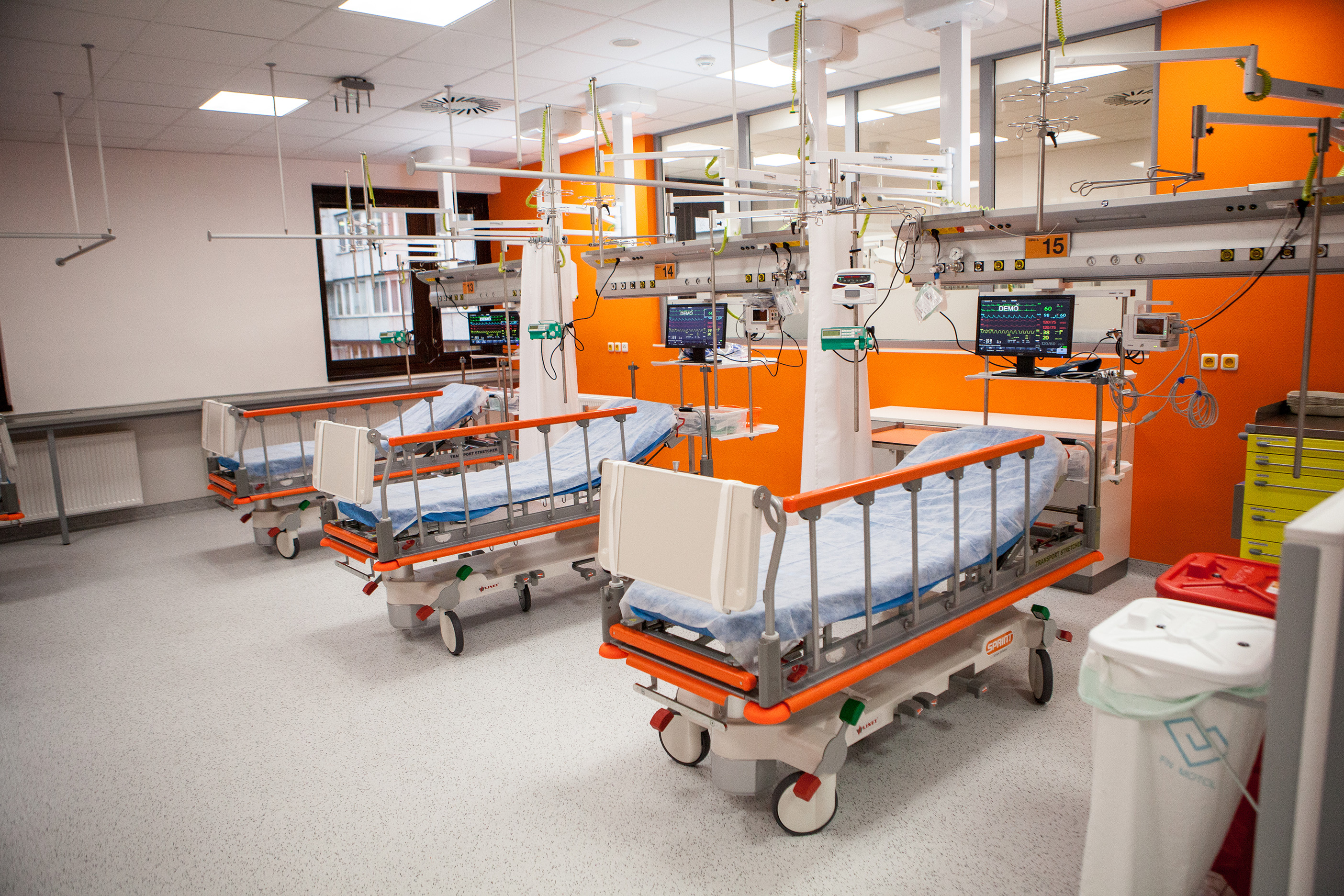

MD Jiří Karásek Ph.D.
224 436 700
Head nurse
224 436 767
Reception (XNUMX hours)
224 436 767
Emergency reception hall, blue building - P
Primary
MD Jiří Karásek Ph.D.
phone: 224 436 713
Email: jiri.karasek@fnmotol.cz
secretariat
Šárka Humlová
phone: 224 436 701
Email: sarka.humlova@fnmotol.cz
Head nurse
Bc. Lucie Vacková
phone: 224 436 705
Email: lucie.vackova@fnmotol.cz
station nurse
Magda Machain
phone: 224 436 706
Email: magda.machainova@fnmotol.cz
The emergency reception department is located in the emergency reception hall (floor "-P of the blue building").
For incoming patients, the first contact is his reception, where a qualified and experienced nurse performs the primary classification of the patient according to the urgency of the condition and according to his character and recommends the patient either to the emergency room, medical first aid or trauma clinic.
There is also an administrative worker at the reception who provides information to relatives on which ward the patient was placed, sells regulatory fees and provides information about the hospital building, ward location, etc. Like the examination department itself, the reception is open 224 hours a day. at No. 436 767 XNUMX. The reception is the main contact point of the hospital for emergency calls from the field and from the emergency services.
From the beginning, the emergency department has a so-called low-threshold character, which means that it provides treatment to patients with acute non-traumatic disease or worsening of chronic disease, regardless of its severity, ie from common diseases to failure of basic vital functions. It should be noted that to the detriment of this service, this service is abused by some patients and the ward often serves them as easily accessible care 24 hours a day instead of visiting a general practitioner's office or an outpatient specialist.
Mission of the department
Urgent adult admission is a ward whose mission is to treat and care for patients with a sudden deterioration in the health condition of the non-accidental cause.
The accident ambulance (traumatology) in the same hospital hall takes care of the accidental disabilities.
Patients are usually brought in ambulances, but we also treat patients who have arrived on their own for acute problems. Due to the small capacity of the ward, it is necessary to perform careful classification and prioritization of treatment. This sorting is performed by a qualified nurse at the reception, event. in more difficult cases he calls a doctor.
Few acute conditions or delayable care (drawing medical care in the absence of a general practitioner or outpatient specialist) can then wait a long time for examination and treatment.
All work on the ward is provided in a given shift by two doctors and three nurses on seven beds. After normal working hours, internal and neurological clinics and revenues to these clinics are operated in the same premises.
The department is located on the lower ground floor (- P) in Emergency reception hall together with the accident outpatient clinic, which takes care of all injuries, and the admission part of the Department of Anaesthesiology and Resuscitation, Charles University, 2nd Faculty of Medicine and IPVZ, which takes care of all critical conditions with vital failure. The ward is accessible best from a covered tunnel, where ambulances arrive and where it is possible to stop at the patient's performance directly in front of the emergency reception hall. The car must then leave for the parking lot, because the tunnel must be permanently passable.
Admission for treatment
Ambulance
Patients are most often brought to us by the emergency services. Although these are not always serious illnesses, patients admitted from the ambulance service are sorted and treated as a matter of priority. Often, after a previous alert for serious conditions, the crew enters the examination bed directly on the ward's premises.
However, due to the increasing use of the rescue service to treat trivial conditions and diseases, even a patient brought by a IB car can wait several hours for an examination after a reclassification of urgency.
Patients with the recommendation of the attending physician
A patient coming to the hospital for an examination or hospitalization on the recommendation of the attending physician (general practitioner, outpatient specialist from the polyclinic, emergency physician, other attending physician) is dealt with on an emergency basis only if it is an acute condition and outpatient department. which the patient has been referred by another doctor is not in operation outside working hours, as not all specialist wards have outpatient clinics open 24 hours a day. If more patients meet at the Emergency Reception Hall at the same time, it is up to the nurse at the reception to hand over patients to the surgery not according to the order of arrival, but according to the urgency of their illness, according to the severity of the condition. In case of dispute or ambiguity, consult the doctor with the case. The capacity of the department is limited in space and personnel and cannot be met at once. However, waiting for treatment in our country is far from the length that is common in foreign emergencies.
Patients without recommendations
We also accept patients without a recommendation. These are mainly patients who do not have a registrar in Prague, are on a business trip, tourists, homeless people and very often they are patients who primarily seek help in a hospital because they do not know that there is a Medical First Aid Service, which they usually manage, for example, the flu, common respiratory diseases, sore throats, back pain or even do not know who their general practitioner is and where he is based. Those who come directly to the hospital, even with trivial difficulties, run the risk of waiting longer and sometimes leave without waiting for treatment, because their patience has been exhausted by waiting.
Emergency fee: 90 CZK
(fee is payable on weekdays from 16:00 to 7:00, Saturday, Sunday and public holidays all day)
The course of treatment
The OUPD doctor will examine you for your current problems, take into account chronic illnesses, if necessary, invite a specialist from the specialist department, make an occupational diagnosis, and initiate urgent treatment, or continue treatment initiated in the prehospital treatment phase. If your condition improves and does not require additional hospitalization care, you will be released home. If your current medical condition requires hospitalization, you will be offered. If you do not wish to accept the offer at your own risk, you will be presented with a document confirming that you refuse to be hospitalized and that you have been informed of the risk for you.
Documentation is kept on the examination and changes in the patient's current state of health. Each examination ends with the delivery of a treatment record to the patient. The record must contain clear recommendations for further action. The patient is also prescribed a prescription for the recommended drug if it is intended for immediate use. You will be instructed by your doctor about the use and other recommended procedures.
Don't be shy to ask if something is not clear to you.
What to take with you
In any case, you must have proof of health insurance, ID card. Apart from imminent threats to life, it is not the duty of the medical staff to provide treatment to a person without valid documents !!
It will come in handy if you have it ready either in memory or on paper:
- what diseases you are being treated for and what medicines you are taking
- when was the last time you were in the hospital and why
- what are your current problems for which you are going to the doctor and how long they last
- Phone to your loved ones to whom you would like to report that you are on hospital treatment
- Phone to neighbors if they should take care of your child or pets
Providing patient information
They are bound by the patient's consent. Unless the patient agrees, health information cannot be provided. It is easier in personal contact, but information is provided by telephone only to a very limited extent, such as: whether or not the patient was treated and whether he went home or is in a hospital and in which department. This is because the person calling cannot be identified and the abuse of this anonymity is unfortunately not exceptional. The staff of the department tries to comply according to the situation, but must take into account the legislative obligation. Therefore, we ask for your understanding, it is a matter of protecting the rights and privacy of the patient, not the reluctance of the staff.
Transport to the hospital and home
You should be prepared for the possibility of being hospitalized as well as the possibility of going home after the treatment. Ambulance transport at the expense of health insurance is exclusively intended for patients who cannot travel by public transport or by car due to serious health reasons (ie they cannot sit, need a stretcher or a wheelchair, etc.). An ambulance is not an automatic claim just because the ambulance brought you to the hospital. There is a taxi service for those who cannot be taken away by family members. Do not press our staff by demanding ambulance just because you consider it your right to pay health insurance. The Health Code does not guarantee any such right. Get dressed on the way to the hospital so that you can get home in decent clothes if you are released.
In addition to standard equipment for routine clinical examinations, the ward is also equipped with devices for managing immediate life-threatening conditions, which requires about 5% of patients brought to the ward by the Emergency Service or by the RLP doctor. This ensures, on the one hand, a smooth continuity of the provision of this care in cases where the rescue of vital functions has already begun by the Rescue Service or the RLP doctor, or its immediate initiation in conditions that require it.
Department Urgent adult income was established at the University Hospital in Motol on January 1, 1. This activity was previously carried out by the Medical Rescue Service of the capital. of Prague. It is a department that provides a type of care abroad called Notfallaufnahme, Urgences, Emergency and the like. Such departments are common in the United States and other English-speaking countries. Most large hospitals in Europe currently have them. We have gained experience from the Netherlands and Belgium.
The attached picture contains some interesting data and statistics for the ten-year operation of the department.
The department works closely with all departments and clinics of the Motol University Hospital, non-stop services of all major specialties, laboratory examinations and complementary examination methods are available, especially sonography, X-rays and CT. This availability is a guarantee of a quick assessment of the patient's health and his transfer to further care in the relevant department, where he is provided with further treatment at a high professional level in accordance with the latest medical science.
The Department of Emergency Admission of Adults at the Motol University Hospital is also a teaching base of the Department of Emergency Medicine and Disaster Medicine of the IPVZ, a training facility for ambulance physicians and students of the Higher Medical School.
